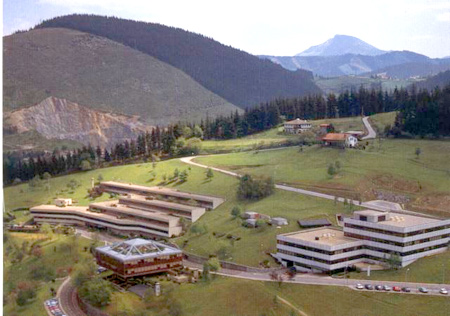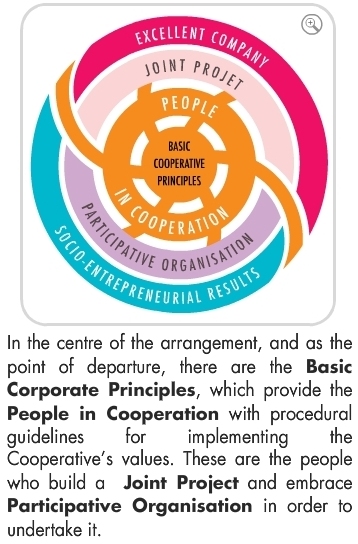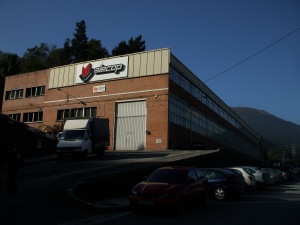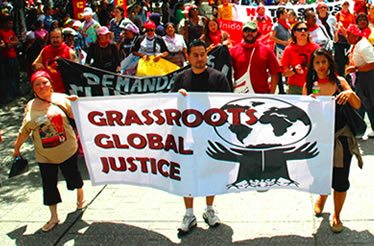Mondragon Diaries: Day Five
Need, Trust, Realism and Well-Chosen Allies
“The world has not been given to us simply to contemplate it, but to transform it. And this transformation is accomplished not only with our manual work, but first with ideas and action plans.”
--Father Jose Maria Arizmendiarrieta, founder of the Mondragon Coops
By Carl Davidson
Keep On, Keepin' On
 Today the Mondragon valley is misty and grey, with small clouds drifting between the mountain peaks. It's somewhat otherworldly, I think to myself on the bus ride up the slopes, almost like a scene from “the Lord of the Rings.”
Today the Mondragon valley is misty and grey, with small clouds drifting between the mountain peaks. It's somewhat otherworldly, I think to myself on the bus ride up the slopes, almost like a scene from “the Lord of the Rings.”
Today is also our last day, and we're full of mixed feelings. Melancholy that our week-long seminar is coming to a close and that the news friends we've made will scatter. But there's also excitement that we'll soon be back home and able to share it all with our communities.
Our first stop is another component allied with Mongragon University called SAIOLAN. It's an incubator project for helping to launch new coops and high-tech businesses.
We're greeted in a classroom by a young woman from Mexico, Isabel Uriberen Tesia, who is also our presenter. She wastes no time bringing up her powerpoint on the screen and getting into the topic.
“Our aim is generating employment, creating new jobs,” she says. “our purpose is to do this by developing new business projects and training new entrepreneurs.”
An few years back, as the economic crisis was developing, nearly 60 percent of the students graduating in the Basque Country were having a hard time finding employment. The government, the MCC coops and other businesses, as well as the students themselves, all turned to SAIOLAN to help launch new enterprises that could put young people to work.
 “There are five levels in the training of entrepreneurs,” Isabel explained. “First is motivation. Second is finding opportunities. Third is defining a suitable project for the student, in tune with his or her interests and ideas. Once you get past these three, the next two, planning the startup and launching what you have developed, also involves finding resources, such as grants and loans, that can get the new businesses operating.”
“There are five levels in the training of entrepreneurs,” Isabel explained. “First is motivation. Second is finding opportunities. Third is defining a suitable project for the student, in tune with his or her interests and ideas. Once you get past these three, the next two, planning the startup and launching what you have developed, also involves finding resources, such as grants and loans, that can get the new businesses operating.”
What kind of businesses were being started? One involved processing plants for cleaning waste water in a new and better way, another was called 'micro-manufacturing,' producing very small components accurately, quite a few were new software products. One from FAGOR, the large home appliance worker-cooperative, involved finding new uses for stainless steel, including exterior products, like one-piece transit stop structures.
Some of our group were concerned that many of the new startups were simply new businesses rather than also coops. This was 80 percent, or 138 out of 172 new small enterprises over the last few years, with 2281 new employees. SAIOLAN didn't seem worried. “It's their choice,” was the explanation. “Some of them will later transform into coops, and in any case, it's good to create new employment for our entire Basque community, not just the minority in cooperatives.”
We got deeper into the subject in our next session. It was further up the mountainside at Otlalora, and we had as our resource person one of the senior MCC leaders, the head of the “Innovation Group', who had been with Mondragon for 48 years.
After laying out some of the basic features of innovation—infrastructure, science, technology, strategic planning—he made it much more real by talking about a fundamental conflict facing all manufacturing businesses, not just MCC. “Take FAGOR, our home appliance manufacturing coop. It's a mature business. We can continue to compete by making some additional improvements in quality, or cutting our profit margins. But in the end, it's going to be very hard to compete with similar products produced in Asia. We should keep at it as long as we can operate in the black and our worker-owners can maintain their standards, but where, really, is our new growth potential?
 He named three broad areas—renewable energy, health and eldercare, and information technology. I got even more interesting to me as he became more specific about new product lines—fuel cells, wind turbines, photovoltaics, embedded software, wireless, ambient intelligence, and bioprocessing in supercomputers. He was presenting the shift from second wave manufacturing to the high-design and high-touch products of a third wave future in a knowledge economy, and he had 200 people working full time on coming up with new ideas and plans.
He named three broad areas—renewable energy, health and eldercare, and information technology. I got even more interesting to me as he became more specific about new product lines—fuel cells, wind turbines, photovoltaics, embedded software, wireless, ambient intelligence, and bioprocessing in supercomputers. He was presenting the shift from second wave manufacturing to the high-design and high-touch products of a third wave future in a knowledge economy, and he had 200 people working full time on coming up with new ideas and plans.
I asked a question. “Have you had any inquiries from those countries trying to define a new 21st century socialism, in whatever way, such as Venezuela, Cuba, China, Vietnam or even South Africa, on how they might use Mondragon's ideas and services? Do you thing you have something to offer here?”
“Yes and No,” was the cautious answer. “We get queries from all of them. We've been to China and other places, and there is some genuine interest, to a point. But since spreading knowledge and worker's power at the workplace also often runs against the clinging to control by bureaucrats, socialist or otherwise., the interest often comes to a dead end. But it's not always the case, and we keep working on doing what we can.”
He went on to discuss the problems of cultural differences. “We Basques are often risk-adverse when it comes to business, unlike Americans. We other avoid risks when we shouldn't. On another hand, when we talk with Mexican workers about owning the firms we start there for themselves, and they elected the leadership, they simply don't believe us. They want to know where the trick is hidden, since businesses are always owned by bosses, never by workers. There is no trust.”
So what are the basic things need to start worker-cooperatives in our countries, asked one of our group?
“First the workers themselves must FEEL THE NEED. Without that, it's hard to get anywhere. Second there must be a culture of TRUST, since you are sharing money, sharing risks, and supporting new leaders. Third, is to BE REALISTIC. You need successes, especially in the beginning. To many early mistakes, and you are finished. Finally you need friends and collaborators, but pick them carefully!”
This had us inspired and buzzing all through lunch, another amazing sampling of Basque cuisine. I had steamed artichokes with a delicious sauce and braised pork, finished off with dark strong coffee and ice cream with slivers of dark chocolate.
The afternoon session featured a presentation of one of the students in MUNDUKIDE, a small overseas assistance program with the people of Mozambique, Brazil, Cuba and a few other countries. The discussion was largely about microloans, which weren't working very well, and road-building, whic was rather successful.
Our final session was with Fred Freundlich, the American professor, who was a veteran of the movements against plant closings in the U.S. A few decades back, who now was a faculty member at Mondragon University. Since he understood both our realities and those at MCC, he could handle any outstanding questions.
There were a lot of them. The first was how much was MCC's success a result of factors unique to the Basque Country. “It's somewhat important, but not decisive,” Fred answered. “One very important . factor was it started at just the right time. If it had started 10 years earlier, conditions may have been too harsh. But the first coops were launched at a time when people really needed a lot of things, and finally had a little savings to spent. Many businesses grew in this period. If it started 10 years later, MCC may have had much stronger competition, and may not have gotten off the ground so well.”
I asked what was the response of the socialist and communist groups in the Basque County and Spain to MCC? “Mixed and confused,” was the answer. Some thought it utopian. Others dismissed it as a diversion, as making workers into capitalists. But they still kept sending delegations for visits, and going away impressed. The Basque left was also fragmented over violence, when ETA, the Basque armed resistance group, assassinated a former leader of one of the MCC coops who was also a socialist official.
After a thoughtful pause, Fred made a point that applied to the U.S. Left as well. “There's two trends in the left,” he explained. “Those who think long and hard about business and what to do with it. And those who mainly like to discuss left ideas.” The implication was that they most often didn't overlap, even if it was wise to do so, both tactically and strategically.
Mikel brought the session to and end by asking us all for our new ideas and projects on how we might implement what we had learned. There were all sorts of plans in the works, from networking food coops, to producing new green products, to making a new film about Mondragon for a U.S audience. We had clearly all had our imaginations fired up by the experience. Mikel gave us each a certificate for completing a 40-hour study seminar, which was a lovely touch. But the truth was that most of us would need no reminder. What we had learned here had changed us, and we would be looking at people and projects in new ways for some time to come.
[Carl Davidson is a national co-chair of the Committees of Correspondence for Democracy and Socialism, a national board member of Solidarity Economy Network, and a local Beaver County, PA member of Steelworkers Associates. If you like this article, make use of the PayPal button above. For more info on these tours, go to http://praxispeace.org]
Read more!
 The high point of the weekend was the Sunday procession of thousands, each carrying a white cross with the name of a slain Latin American peasant, worker or child, and a number of priests and nuns, including Salvadoran Archbishop Oscar Romero, slain by those trained in Fort Benning’s SOA facility. Teams of singers mournfully sang the names and ages, and after each one, everyone raised their crosses, and answered with the classic salute of the living to those who have fallen in battle: “Presente!”
The high point of the weekend was the Sunday procession of thousands, each carrying a white cross with the name of a slain Latin American peasant, worker or child, and a number of priests and nuns, including Salvadoran Archbishop Oscar Romero, slain by those trained in Fort Benning’s SOA facility. Teams of singers mournfully sang the names and ages, and after each one, everyone raised their crosses, and answered with the classic salute of the living to those who have fallen in battle: “Presente!” 





 Today the Mondragon valley is misty and grey, with small clouds drifting between the mountain peaks. It's somewhat otherworldly, I think to myself on the bus ride up the slopes, almost like a scene from “the Lord of the Rings.”
Today the Mondragon valley is misty and grey, with small clouds drifting between the mountain peaks. It's somewhat otherworldly, I think to myself on the bus ride up the slopes, almost like a scene from “the Lord of the Rings.”  He named three broad areas—renewable energy, health and eldercare, and information technology. I got even more interesting to me as he became more specific about new product lines—fuel cells, wind turbines, photovoltaics, embedded software, wireless, ambient intelligence, and bioprocessing in supercomputers. He was presenting the shift from second wave manufacturing to the high-design and high-touch products of a third wave future in a knowledge economy, and he had 200 people working full time on coming up with new ideas and plans.
He named three broad areas—renewable energy, health and eldercare, and information technology. I got even more interesting to me as he became more specific about new product lines—fuel cells, wind turbines, photovoltaics, embedded software, wireless, ambient intelligence, and bioprocessing in supercomputers. He was presenting the shift from second wave manufacturing to the high-design and high-touch products of a third wave future in a knowledge economy, and he had 200 people working full time on coming up with new ideas and plans. Most new small businesses fail. That's a fact, whether they are in the Basque Country or in the U.S. Or anywhere else, Yet the Mondragon Coops, which all started as small worker-owned businesses, have hardly ever failed. Why? The key is in Father Jose Maria Arizmendi's original founding conception of cooperatives as the interlocking of school, factory and credit union.
Most new small businesses fail. That's a fact, whether they are in the Basque Country or in the U.S. Or anywhere else, Yet the Mondragon Coops, which all started as small worker-owned businesses, have hardly ever failed. Why? The key is in Father Jose Maria Arizmendi's original founding conception of cooperatives as the interlocking of school, factory and credit union.
 This morning our bus again takes us far up the winding mountain road to the 15th Century blockhouse fortress now transformed into a conference center. I've since found out it's called Otalora, after an old noble family who owned the whole area reaching back 600 years. In those days, in was an armed way station on a trade route between the center of Spain and the sea, and the Otalora family extracted heavy taxes on the traffic going both ways.
This morning our bus again takes us far up the winding mountain road to the 15th Century blockhouse fortress now transformed into a conference center. I've since found out it's called Otalora, after an old noble family who owned the whole area reaching back 600 years. In those days, in was an armed way station on a trade route between the center of Spain and the sea, and the Otalora family extracted heavy taxes on the traffic going both ways.  But as Jose continued expanding of MCC's approach, which put the core values of worker ownership and democracy at the center of an ever-widening set of values and organizational principles, the mood in the room began to change. He then took each component, and in a wonderful set of inter-linked graphic images, he unfolded a number of powerful tools that could be adapted to any progressive organization to build its strength, grow its size and achieve its goals.
But as Jose continued expanding of MCC's approach, which put the core values of worker ownership and democracy at the center of an ever-widening set of values and organizational principles, the mood in the room began to change. He then took each component, and in a wonderful set of inter-linked graphic images, he unfolded a number of powerful tools that could be adapted to any progressive organization to build its strength, grow its size and achieve its goals. After lunch, we boarded our bus and headed back down the mountainside to the town of Assarte-Mondragon. We were visiting IKERLAN, on of MCC's thirteen Research and Development cooperatives. It was the first and the largest, and had a number of research lines. It included 209 full-time research scientists as worker-owners, and another 54 trainees. “Effective Innovation at the service of our company clients” was how Maria, our presenter, summed up their mission. She went on to describe energy saving power stations, micro-needles for bio-tech medicine, new computer components for smart electrical grids, touch screen control panels for the home automation, and so on. “Less energy, with lighter materials at lower costs” is a common thread, she added.
After lunch, we boarded our bus and headed back down the mountainside to the town of Assarte-Mondragon. We were visiting IKERLAN, on of MCC's thirteen Research and Development cooperatives. It was the first and the largest, and had a number of research lines. It included 209 full-time research scientists as worker-owners, and another 54 trainees. “Effective Innovation at the service of our company clients” was how Maria, our presenter, summed up their mission. She went on to describe energy saving power stations, micro-needles for bio-tech medicine, new computer components for smart electrical grids, touch screen control panels for the home automation, and so on. “Less energy, with lighter materials at lower costs” is a common thread, she added. This bright and sunny morning in the Basque Country mountain air again begins with our bus slowly winding up the mountain slopes, but this time its a short ride. We stop at ALECOP, a unique worker-student cooperative that is at once part of Mondragon's production units and its educational system. Think of it as a small worker-owned community college, but with technology shops that actually produce items for sale in industrial markets, and you won't be far off.
This bright and sunny morning in the Basque Country mountain air again begins with our bus slowly winding up the mountain slopes, but this time its a short ride. We stop at ALECOP, a unique worker-student cooperative that is at once part of Mondragon's production units and its educational system. Think of it as a small worker-owned community college, but with technology shops that actually produce items for sale in industrial markets, and you won't be far off. It all becomes much clearer once he takes the 25 of us out into the shop area. As someone who taught computer repair to inner city youth and ex-offenders by recycling old computers, I step away from the group and examine some of the teaching stations. They are large panels with, for example, critical automotive parts on one side, connected with various testers and gauges. I examine the back side and find the motherboards and circuitry connecting them all. A student who wanted to become an auto mechanic, for example, could test and work through the key components of dozens of vehicles on the front side, while the programming embedded in the back side would give him or her the proper positive or negative training responses. Very cool, I thought. Even cooler was the fact that the students not only used these machines for their own learning, they also made the circuit boards and wrote the software to make these instructional learning tools in quantity, ready to be sold and used anywhere.
It all becomes much clearer once he takes the 25 of us out into the shop area. As someone who taught computer repair to inner city youth and ex-offenders by recycling old computers, I step away from the group and examine some of the teaching stations. They are large panels with, for example, critical automotive parts on one side, connected with various testers and gauges. I examine the back side and find the motherboards and circuitry connecting them all. A student who wanted to become an auto mechanic, for example, could test and work through the key components of dozens of vehicles on the front side, while the programming embedded in the back side would give him or her the proper positive or negative training responses. Very cool, I thought. Even cooler was the fact that the students not only used these machines for their own learning, they also made the circuit boards and wrote the software to make these instructional learning tools in quantity, ready to be sold and used anywhere.  By Carl Davidson
By Carl Davidson other part of the slogan refers to the scope of the cooperatives. Of the 120 workplaces, 87 are industrial factories, making everything from kitchen appliances and housewares, to motor buses, auto parts, computers, and machine tools. One of the coops is a large bank, Caja Laboral. One is a Mondragon University, with some 4000 student; seven others are research and development centers. One is retail the huge network of hundreds of Eroski supermarkets and convenience stores, four are agricultural, and six are social service agencies managing health care, pensions, and other insurance matters. All are worker owned. All have the management selected by the works and the coops. All have yearly assemblies were the workers set strategies and make or change policies.
other part of the slogan refers to the scope of the cooperatives. Of the 120 workplaces, 87 are industrial factories, making everything from kitchen appliances and housewares, to motor buses, auto parts, computers, and machine tools. One of the coops is a large bank, Caja Laboral. One is a Mondragon University, with some 4000 student; seven others are research and development centers. One is retail the huge network of hundreds of Eroski supermarkets and convenience stores, four are agricultural, and six are social service agencies managing health care, pensions, and other insurance matters. All are worker owned. All have the management selected by the works and the coops. All have yearly assemblies were the workers set strategies and make or change policies.














